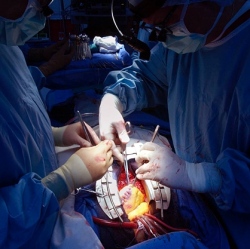
An elderly organ in a living animal has been regenerated into a youthful state for the first time, UK researchers say. The thymus, which is critical for immune function, becomes smaller and less effective with age, making people more susceptible to infection. A team at the University of Edinburgh managed to rejuvenate the organ in mice by manipulating DNA.
Experts said the study was likely to have "broad implications" for regenerative medicine. The thymus, which sits near the heart, produces T-cells to fight off infection. However, by the age of 70 the thymus is just a tenth of the size in adolescents.
"This has a lot of impacts later in life, when the functionality of the immune system decreases with age and you become more vulnerable to infection and less responsive to vaccines," one of the researchers, Dr Nick Bredenkamp, told the BBC.
The team at the MRC Centre for Regenerative Medicine at the University of Edinburgh tried to regenerate the thymus of old mice. A gene, called Foxn1, naturally gets shut down as the thymus ages. So they tried to boost it back to youthful levels.
A drug was used to increase the activity of the gene in elderly mice. The results, published in the journal Development, showed that boosting Foxn1 activity in elderly mice could give them the thymus of a much younger animal.
